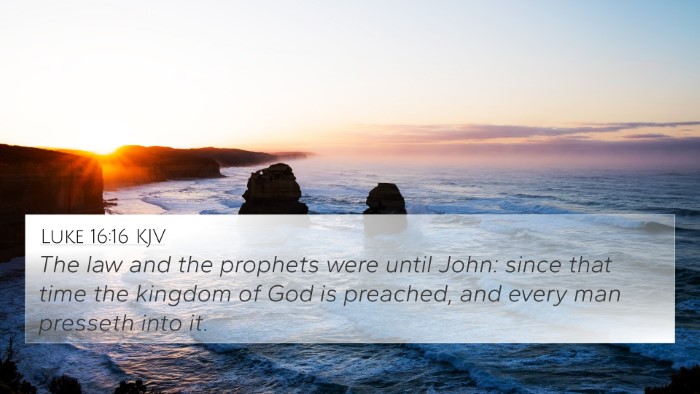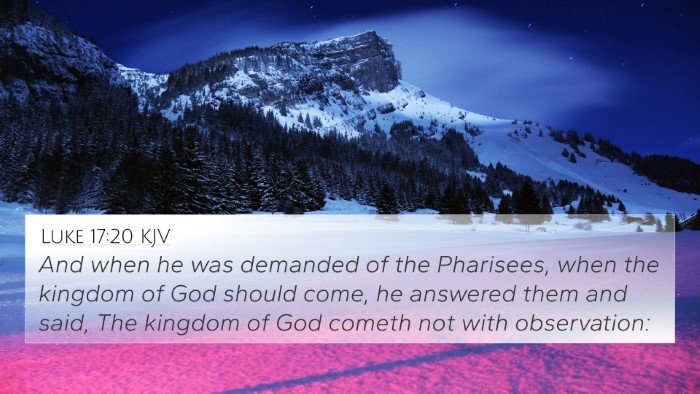Understanding Matthew 12:28
Matthew 12:28 states: "But if I cast out devils by the Spirit of God, then the kingdom of God is come unto you." This verse is significant within the context of Jesus' ministry, illustrating the power of God’s Spirit and the establishment of His kingdom.
Exegetical Insights
According to Matthew Henry, this verse emphasizes the authority and divine power of Christ in healing and casting out demons. Henry notes that the coming of God’s kingdom is manifested through Christ’s works, indicating that where there is divine intervention, there also lies the kingdom of God.
Albert Barnes elaborates that Jesus here acknowledges the reality of spiritual warfare, affirming that His ability to cast out demons is indicative of the presence of God’s kingdom on earth. This implies that the victory over evil is proof of God's active reign.
Adam Clarke provides additional commentary on the implications of this statement. He interprets the phrase "by the Spirit of God" to affirm that Jesus conducts His ministry through divine empowerment, thereby renouncing any accusations of working through evil powers.
Thematic Connections
This verse can be cross-referenced with various Bible verses that address similar themes or concepts, providing a deeper understanding of the narrative:
- Luke 11:20 – Similar to Matthew 12:28, this verse states, "But if I cast out demons with the finger of God, then the kingdom of God has come upon you," reinforcing the same idea of divine power manifesting through Jesus.
- Matthew 9:35 – This verse outlines Jesus' travels and ministry, indicating He "healed every disease and sickness," a precursor to His casting out of demons.
- Mark 3:27 – Jesus illustrates a principle of spiritual authority, saying, "No one can enter a strong man's house and plunder his goods, unless he first binds the strong man," linking His ability to cast out demons to His dominion over them.
- Romans 14:17 – This passage talks about the kingdom of God being about righteousness, peace, and joy in the Holy Spirit, emphasizing the spiritual nature of the kingdom Jesus speaks of.
- Acts 10:38 – Refers to how God anointed Jesus of Nazareth with the Holy Spirit and power to do good and heal, making clear the source of His authority.
- 1 John 3:8 – This verse explains that the reason the Son of God appeared was to destroy the works of the devil, which aligns with the casting out of demons.
- Matthew 4:24 – Shows how news about Jesus' healing powers spread throughout Syria, reinforcing His role in combating spiritual and physical ailments.
- Ephesians 6:12 – Discusses the reality of spiritual warfare, noting that we wrestle not against flesh and blood, further underscoring the significance of Jesus’ actions.
Inter-Biblical Dialogue
Matthew 12:28 also invites a dialogue between various biblical texts, especially when considering Jesus' ministry in relation to the prophetic texts of the Old Testament. The kingdom of God concept finds its roots in the prophetic promises of restoration and the defeat of evil forces.
This verse serves as a pivotal point, linking various narratives across the scripture, showcasing how Jesus fulfills the prophecies and establishes His reign through the expulsion of evil, thus transforming believers' understanding of God's active role in their lives.
Conclusion
Understanding Matthew 12:28 requires looking at it within the broader scope of scripture. The works of Jesus are not isolated events; they are part of the larger narrative of God's kingdom. Engaging in Bible cross-referencing provides believers with a comprehensive understanding of spiritual truths and encourages deeper theological reflection.
This verse's inclusion in comparative Bible verse analysis and thematic studies enhances the comprehension of how the New Testament fulfills the Old Testament prophecies, offering a rich field for exploration and study.






















